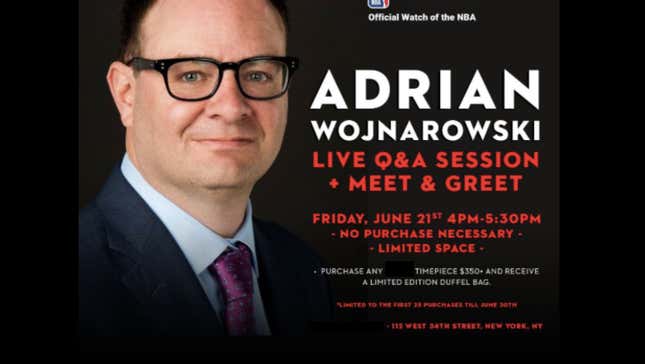
Adrian Wojnarowski, ESPN’s most prolific and trusted NBA reporter, is now a brand bot for a company that is partnered with the league he is, in theory, supposed to be covering aggressively and adversarially.
In 2015, the watchmaker and the NBA announced a multi-year partnership, and then last year it expanded that partnership to include individual teams and athletes. Now it’s expanding once more by paying Wojnarowski to tweet out commercials and do sponsored meet-and-greets:
It’s embarrassing for any journalist to sell his voice and credibility to a company in the service of selling some ugly product, or any product really, but the move is particularly unethical in this situation, given that the brand Wojnarowski is taking money from is also an official partner of the league he ostensibly covers as a journalist. The watch company, as the NBA’s partner, is invested in the NBA, its teams, and its players getting positive media attention. Wojnarowski, as the foremost NBA reporter for the largest sports media company in the country, is supposedly invested in reporting on the NBA, its teams, and its players, even when said reporting may not make his subjects look good. But now Wojnarowski is paid by the watch company, that wants good NBA press, to hawk tacky watches. That’s about as clear as a conflict of interest can be.
I reached out to ESPN to ask what role the network had in the deal; when and how exactly ESPN personalities and reporters are allowed to use their massive ESPN platforms to sign ad deals with brands; and if Wojnarowski will be required to disclose that he is paid by an NBA league sponsor on his future reports. ESPN declined to comment. I also contacted Wojnarowski to ask about the terms of the deal and if he thought his new role as a shill for an NBA partner jeopardized his credibility as a reporter covering the league. When reached on the phone, he also declined to comment.
Sports media, and to a lesser extent media in general, has long been sliding towards a future where reporting and advertising is all slopped together in one stinking conflict-of-interest stew. Recently, sports media companies have been positively scurrying to further erase the line between what is journalism and what is advertising. You have ESPN The Magazine running sponcon for Kevin Durant. There’s Bill Simmons talking abut how it’s great when brands get to “naturally integrate” with editorial work. There was Shams Charania, at the Athletic, writing a fluffy profile of Derrick Rose while his other employer made a documentary with Rose. There’s Sports Illustrated’s new owners fantasizing about all the ways they can use the SI name to sell shit. You have Yahoo Sports literally paying the Mets for access so they can then turn around and sell that content. Remember when all those respectable sports journalists shilled beer because a commercial made them feel feelings?
Taken in this context, Wojnarowski taking money in exchange for tweeting out some—and I can’t stress this enough—truly horrendous-looking watches, as if this watch news was on par with his regular NBA trade reports, might just seem like more of business as usual. That’s precisely the problem, though. The more incremental the erosion of the walls that once divided journalism and advertising becomes, the less likely it is that anyone is going to notice the damage being done.